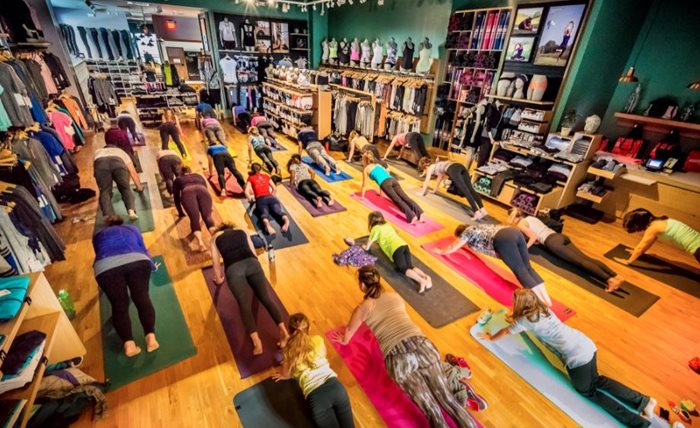Whether a coffee shop, restaurant or an entire high street, retail design should be driven by understanding audiences and creating an authentic sense of place, says
Ibrahim Ibrahim, Managing Director,
Portland Design Ibrahim Ibrahim, Managing Director, Portland Design
Ibrahim Ibrahim, Managing Director, Portland Design
As a retail design and strategy business, understanding the behaviour of audiences, whether a coffee shop, restaurant or high street retailer, drives everything we do. Our mantra is ‘people and places, not buildings and spaces’.
‘Citizen first’ is another important part of our philosophy. We never forget that people are citizens first and that if we treat them with a duty of care they will then
become customers.
Segmentation is no longer about demographics – it’s about interests and behaviour. Increasingly, we do not identify those citizens as Generation X, Y or Z – we call them ‘Generation C’.
"Generation C demands the ability to collaborate with and shape brands"
The key demand from Generation C is control. Control in everything they do when it comes to engaging with brands – whether that’s simplicity, convenience, transparency, or having what they want, when they want, how they want it.
Generation C demands the ability to collaborate with and shape brands. They want to be part of communities with brands at the centre. And of course, they have a conscience, they care about the role a brand plays in their day-to-day lives and the wider world.
We believe businesses must develop their understanding and response to the four key pillars of what we call ‘future readiness’, especially when it comes to the challenges of Covid-19.
1. Reinvent convenience
Convenience is at the heart of all consumer expectations, because they live increasingly transient lives and they want things to happen quickly and seamlessly. Convenience is about simplicity, ease and ‘nowness’ – 63% of global consumers are willing to pay more for simpler brand experiences, according to research by Siegel+Gale.
So, whether introducing click & collect, or geo-located automated coffee machines that can prepare beverages in advance of customers’ arrival, this is a response to ‘just-in-time’ living and reinventing convenience by stripping out complexity.
2. Create community
In the future, consumers won’t just buy brands; they’ll join them. That’s why being a ‘Join Brand’ is an important response to the expectation from consumers to feel part of a brand community that responds to their interests and passions.
So are you a ‘Buy Brand’ or a ‘Join Brand’?
Well, a Buy Brand exists in the mind of the consumer; whereas a Join Brand inhabits the life of the consumer. While Buy Brands are about sales, Join Brands are about branded rituals. Buy Brands are about sampling and trialling, Join Brands are about learning and community.
Buy Brands focus on what the brand says to customers, Join Brands focus on what consumers say to each other. Buy Brands focus on the experience before the transaction whereas Join Brands focus on the experience after the transaction.
 Consumer participation at a LuLuLemon Athletica store in Canada | Photo credit: Charles Wills
Consumer participation at a LuLuLemon Athletica store in Canada | Photo credit: Charles Wills
3. Reimagining the experience
We’re all familiar with the concept of a third place between home and work. But the fourth place is the new notion of the ‘shop’ that plays a big part of activating the public realm and blending with other experiences.
Being data-driven and understanding what drives behaviour is hugely important. Capturing data is not sufficient. We must define the insights from the data and then ensure we design environments and experiences that are ‘data responsive’, creating environments that are programmable to create places for living, working, gathering and purchasing in high streets.
This is the new notion of retail where participation is the new consumption, where shopping, working, entertainment, learning, culture and hospitality converge. We call it S.W.E.L.C.H.
Research from shopping centre group Westfield shows nearly a third of UK shoppers are interested in attending a lifestyle class at their favourite store. Five years ago we would never have thought the new consumption would be going to your local store for class. IKEA, Lulu Lemon and Patagonia are just a few of the many brands embracing this idea of learning and participation.
"The future high streets, town centres and retail destinations must be ‘serendipity machines’"
With SWELCH we want to create the new living rooms of our public realm and coffee can be the ‘community glue’ for these new spaces. We must think beyond simply leasing stores and filling shelves and instead curate experiences that are driven by a deep understanding of our audience.
4.Repositioning value
When it comes to delivering our audience’s expectations of value on the high street, coffee shops will continue to play a huge role. Localism is key, but the real challenge is blending local and independent brands with national and international brands. The real estate industry has traditionally shied away from this challenge because of their covenants and rent models, but we must find new models to bring independent and big brands together.
Consumers are increasingly seeking experiences that are surprising, unplanned and serendipitous. The future high streets, town centres and retail destinations must be ‘serendipity machines’.
Covid-19 has led to the death of precedent; what’s gone before is no longer a reliable guide. We must use this crisis as an opportunity to rethink and reimagine our retail places. So, my message is: do and learn, don’t wait and see. And if you want to be 100% sure, you’ll be 100% late.
There are three types of business leader in this world: Those who make it happen; those who let it happen; and those who wondered what happened. Don’t wonder what happened – Let’s get future ready.
This article was first published in Issue 6 of 5THWAVE magazine.
Subscribe to 5THWAVE to receive each edition in print and digitally or sign up to our newsletter and be the first to read the latest articles and updates on World Coffee Portal research
